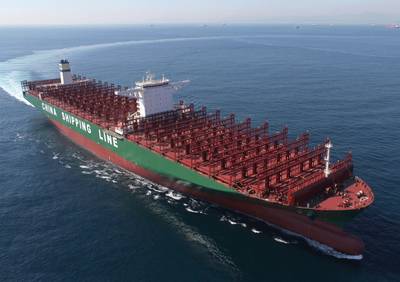A new study examines the steady decline of the U.S. Merchant Marine fleet, which today numbers less than 100 vessels in international trade, and warns that U.S. global competitiveness and maritime security -- particularly in light of a fast-emerging China -- is at grave risk unless investment is made to grow the U.S. flag fleet and influence on the world's waters. “Sea Strangulation: How the United States has Become Vulnerable to Chinese Maritime Coercion,” authored by political scientist and expert on ‘coercive diplomacy’ Dr. Patrick Bratton, along with a historian on sea power, retired U.S. Navy Captain Carl Schuster, both of Hawai`i Pacific University, the study concludes that the United States has never been so dependent on imports and exports delivered by ship as it is today, and never has the nation had fewer of its own ships to carry goods.
The paper outlines serious threats to U.S. civilians and military personnel as a result of an over-dependence on the ships of other nations, in particular China, and simultaneous vulnerability caused by a dearth of American-flagged vessels in international trade.
In contrast to the U.S. Merchant Marine that numbers less than 100 vessels in international trade, the study found that The People’s Republic of China, by contrast, has nearly doubled its commercial fleet since 2010 with more than 3,900 ships now flying the Chinese flag. With expanding military as well as commercial power, Bratton and Schuster contend in the report, that an increasingly hostile China can use its growing domination of global shipping to enforce its strategic and military objectives, including the control and potential cut-off of military and civilian goods.
• Refusal to carry supplies to U.S. troops during a future military or foreign policy crisis
• Refusal to supply U.S. strategic allies
• Denying access to critical vessels, such as Arctic icebreakers, owned and operated by Russia -- which operates 41 icebreakers, including a nuclear powered vessel; the United States, by contrast, only has two
• Banning – or threatening to ban – commercial shipments to U.S. overseas states and territories, such as Hawai’i, Alaska, Guam, Puerto Rico and the U.S. Virgin Islands. (In Hawai’i, for example, local food supplies would last about ten days in the event of an embargo)
• Shutting down commercial trade and punishing the United States by creating “no go zones” for commercial vessels or simply ordering Chinese vessels not to service U.S. ports
The authors note that some special interests in Puerto Rico and elsewhere are pushing hard to modify or completely eliminate the Jones Act and the U.S. Maritime Security Program (MSP), which together provide incentives for private companies to build, operate and maintain U.S. ships flying under the U.S. flag.
“The best and perhaps the only way we can counter the threat of Sea Strangulation is to strengthen and expand the United States’ merchant marine,” write Bratton and Schuster. “In contrast, an over-dependence on flags of convenience carriers and ships belonging to China or other nations that may test us could lead to hardship for those who live and serve under the flag of the United States.”
“Along with cyber attacks and espionage, China is developing a ‘blue water Navy,’ and new Chinese defense installations on the Spratly Islands now pose a threat to 40 percent of the world’s shipping. However, few people realize that China does not need to launch a naval attack or conduct a blockade to harm us. The economic power of their huge merchant marine, which gives them the ability to control shipping rates and service, has the potential to wreak havoc on our economy," said Don Marcus, President of the International Organization of Masters, Mates & Pilots, the union that represents sea captains and deck officers on U.S.-flagged vessels.
The report can be found online at: http://www.hpu.edu/CHSS/History/DeptNews/SeaStrangulation11_171.pdf#Read















